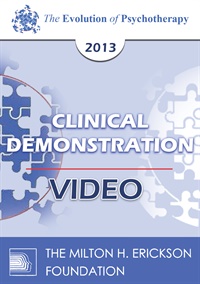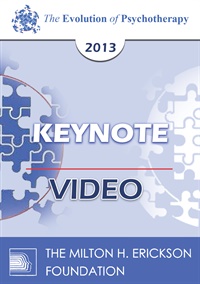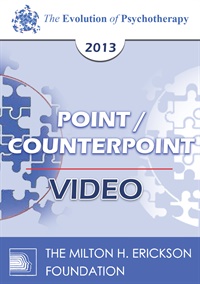
- Average Rating:
- Not yet rated
- Topic Areas:
- Couples Therapy | Dialogues | Relationships | Therapist Development
- Categories:
- Evolution of Psychotherapy | Evolution of Psychotherapy 2009 | Pioneers in Couples and Family Therapy
- Faculty:
- John Gottman, PhD | Julie Gottman, PhD | Salvador Minuchin, MD
- Duration:
- 1 Hour
- Format:
- Audio Only
- Original Program Date:
- Dec 12, 2009
- Short Description:
- This discussion explores trust, repair, and relational resilience. The Gottmans share research on what sustains long-term bonds, including humor, gentleness, and shared meaning. Minuchin reflects on the architecture of secure relationships, addressing conflict, intimacy, and post-infidelity repair through a systemic lens.
- Price:
- $15.00 - Base Price

- Average Rating:
- Not yet rated
- Topic Areas:
- Dialogues | Humor | Psychotherapy | Therapist Development | Ericksonian Hypnosis and Therapy Techniques
- Categories:
- Evolution of Psychotherapy | Evolution of Psychotherapy 2009 | Pioneers in Couples and Family Therapy
- Faculty:
- Cloe Madanes, HDL, LIC | Jeffrey Zeig, PhD
- Duration:
- 55 Minutes
- Format:
- Audio Only
- Original Program Date:
- Dec 12, 2009
- Short Description:
- This dialogue highlights the role of humor in therapy as a tool for connection and transformation. Through case examples and personal stories, the speakers demonstrate how laughter, creativity, and well-timed humor can shift perspective and make therapeutic interventions more effective.
- Price:
- $15.00 - Base Price

- Average Rating:
- Not yet rated
- Topic Areas:
- Invited Addresses | Psychotherapy | Therapist Development
- Categories:
- Evolution of Psychotherapy | Evolution of Psychotherapy 2009
- Faculty:
- David Burns, MD
- Duration:
- 1 Hour 1 Minutes
- Format:
- Audio Only
- Original Program Date:
- Dec 11, 2009
- Short Description:
- Dr. Burns will describe disturbing new research on the accuracy, or lack of accuracy of clinician’s perceptions of how patients feel, and how they feel about us. He will illustrate new, brief and highly accurate assessment instruments that can dramatically boost your clinical understanding and effectiveness.
- Price:
- $15.00 - Base Price
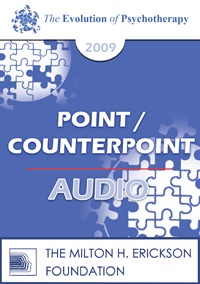
- Average Rating:
- Not yet rated
- Topic Areas:
- Point/Counterpoint Sessions | Psychotherapy | Therapist Development
- Categories:
- Evolution of Psychotherapy | Evolution of Psychotherapy 2009
- Faculty:
- Donald Meichenbaum, PhD
- Duration:
- 1 Hour 23 Minutes
- Format:
- Audio Only
- Original Program Date:
- Dec 09, 2009
- Short Description:
- A major challenge for any skills-oriented intervention is the issue of treatment generalization. Psychotherapists cannot just “train and hope” for transfer. In this presentation, Dr. Meichenbaum will discuss and demonstrate what needs to be done before, during and after interventions to make them more effective. He will discuss specific steps that psychotherapists should take to increase the likelihood of maintenance and generalization across settings and across response domains.
- Price:
- $15.00 - Base Price
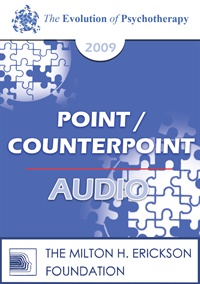
- Average Rating:
- Not yet rated
- Topic Areas:
- Point/Counterpoint Sessions | Psychotherapy | Therapist Development | Clinical Process
- Categories:
- Evolution of Psychotherapy | Evolution of Psychotherapy 2009
- Faculty:
- David Barlow, PhD
- Duration:
- 1 Hour 33 Minutes
- Format:
- Audio Only
- Original Program Date:
- Dec 10, 2009
- Short Description:
- This point–counterpoint session takes on how psychological disorders should be classified and what those choices mean for therapy. The discussion contrasts diagnosis-based categories with dimensional, transdiagnostic models that emphasize temperament, emotion regulation, and shared mechanisms across anxiety and mood disorders. Participants hear a thoughtful debate on vulnerability versus resilience, the role of self-efficacy and attachment, and how research on emotion, learning, and control can reshape both assessment and treatment. The session invites clinicians to rethink diagnosis not as an endpoint, but as a guide to more flexible, principle-driven intervention.
- Price:
- $15.00 - Base Price
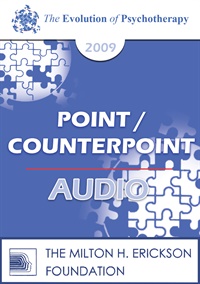
- Average Rating:
- Not yet rated
- Topic Areas:
- Point/Counterpoint Sessions | Art and Creativity | Psychotherapy | Therapist Development
- Categories:
- Evolution of Psychotherapy | Evolution of Psychotherapy 2009
- Faculty:
- Jeffrey Zeig, PhD
- Duration:
- 1 Hour 11 Minutes
- Format:
- Audio Only
- Original Program Date:
- Dec 12, 2009
- Short Description:
- Science measures, art impacts. We will study methods of impact used in various arts, including painting, music, writing, movies and dance. These methods can be applied in therapy where they can provide impact, making clinical work more experiential, more effective. A model will be offered and explained.
- Price:
- $15.00 - Base Price

- Average Rating:
- Not yet rated
- Topic Areas:
- Workshops | Psychotherapy | Therapist Development
- Categories:
- Evolution of Psychotherapy | Evolution of Psychotherapy 2009
- Faculty:
- Scott Miller, PhD
- Duration:
- 2 Hours 51 Minutes
- Format:
- Audio Only
- Original Program Date:
- Dec 09, 2009
- Short Description:
- Thanks to a number of recent studies, there is now solid empirical evidence for what distinguishes highly effective therapists.In this workshop, participants will learn in detail the qualities and practices that separate the great from the good. Participants also will find out about a system of feedback procedures that can be used to develop a profile of their most and least effective moments in therapy – what works and what doesn’t. Not only will attendees get a far more exact idea of their clinical strengths and weaknesses, and how to use the findings in which to improve their own practice, but they also will come away with concrete tools that will immediately boost clinical abilities and effectiveness.
- Price:
- $15.00 - Base Price

- Average Rating:
- Not yet rated
- Topic Areas:
- Workshops | Couples Therapy | Supervision | Therapist Development | Family Therapy
- Categories:
- Evolution of Psychotherapy | Evolution of Psychotherapy 2009 | Pioneers in Couples and Family Therapy
- Faculty:
- Claudia Black, PhD
- Duration:
- 2 Hours 41 Minutes
- Format:
- Audio Only
- Original Program Date:
- Dec 09, 2009
- Short Description:
- This session addresses the impact of sexual betrayal and compulsive sexual behavior on partners and families. Black examines co-sex addiction, family of origin issues, and the dynamics of deception and false perceptions in relationships. Topics include early stabilization, full disclosure, boundary setting, codependency, spiritual healing, and recovery strategies.
- Price:
- $15.00 - Base Price

- Average Rating:
- Not yet rated
- Topic Areas:
- Psychotherapy | Workshops | Art and Creativity | Experiential Therapy | Therapist Development
- Categories:
- Evolution of Psychotherapy | Evolution of Psychotherapy 2009
- Faculty:
- Jeffrey Zeig, PhD
- Duration:
- 1 Hour 51 Minutes
- Format:
- Audio Only
- Original Program Date:
- Dec 10, 2009
- Short Description:
- Experiential methods enliven therapy through dynamic experiences that promote dynamic realizations. We will explore methods that make therapy a visual art, recognizing the visual realizations are neurologically encoded more robustly than words, hence more easily accessed when needed. We will explore the use of gestures, objects, and even sounds to empower change. We will learn the latest advances in therapist sculpting. Lecture, demonstration, and small group exercises will be used
- Price:
- $15.00 - Base Price

- Average Rating:
- Not yet rated
- Topic Areas:
- Workshops | Multicultural | Psychotherapy | Therapist Development
- Categories:
- Evolution of Psychotherapy | Evolution of Psychotherapy 2009
- Faculty:
- Jean Houston, PhD
- Duration:
- 1 Hour 46 Minutes
- Format:
- Audio Only
- Original Program Date:
- Dec 13, 2009
- Short Description:
- Dr Houston will offer a spectrum of ways designed to evoke new capacities in yourself and your clients in at least four areas: sensory and physical, psychological, myths and symbols, as well as spiritual. She will hope to entice you into high sensory development, radical empathy, luminous intelligence, and a polyphrenic nature (enjoying and utilizing the many selves you contain within you). The hope is that the values offered in this workshop will stimulate a passion for the possible,and a capacity to take on the tasks of a world in transition.
- Price:
- $15.00 - Base Price

- Average Rating:
- Not yet rated
- Topic Areas:
- Psychotherapy | Workshops | Attunement | Therapeutic Relationship | Therapist Development
- Categories:
- Evolution of Psychotherapy | Evolution of Psychotherapy 2009
- Faculty:
- Jeffrey Zeig, PhD
- Duration:
- 1 Hour 43 Minutes
- Format:
- Audio Only
- Original Program Date:
- Dec 13, 2009
- Short Description:
- Attunement can be considered the deepest level of rapport, a foundation of empathy. We will learn how to attune to affect,behavior, cognition, attitude, perception, and relationship patterns – even how to attune to the preconscious associations that drive behavior. A precursor to every intervention, attunement will be described from the perspective of hypnosis, psychotherapy, and social psychology. Clinical applications will be demonstrated and discussed. Includes small-group practice exercises.
- Price:
- $15.00 - Base Price
- Average Rating:
- Not yet rated
- Topic Areas:
- Clinical Demonstrations | Psychotherapy | Chain Analysis | Therapist Development
- Categories:
- Evolution of Psychotherapy | Evolution of Psychotherapy 2013
- Faculty:
- Marsha Linehan, PhD
- Course Levels:
- Master Degree or Higher in Health-Related Field
- Duration:
- 1:00:09
- Format:
- Audio and Video
- Original Program Date:
- Dec 13, 2013
- Short Description:
- This demonstration will focus on a set of strategies aimed at analyzing factors associated with dysfunctional and/or out-of-control behaviors. Included will be a brief review of a missing links analysis aimed at understanding the absence of expected or needed behaviors.
- Price:
-
Sale is $29.00
price reduced from Base Price - $59.00
- Average Rating:
- Not yet rated
- Topic Areas:
- Clinical Demonstrations | Psychotherapy | Feedback Informed Treatment (FIT) | Relationships | Therapeutic Relationship | Tailoring | Therapist Development
- Categories:
- Evolution of Psychotherapy | Evolution of Psychotherapy 2013
- Faculty:
- Scott Miller, PhD
- Course Levels:
- Master Degree or Higher in Health-Related Field
- Duration:
- 1:00:38
- Format:
- Audio and Video
- Original Program Date:
- Dec 13, 2013
- Short Description:
- Feedback-Informed Treatment (FIT) dramatically improves both retention and outcome of behavioral health services. FIT involves routinely and formally soliciting feedback from clients regarding the therapeutic alliance and outcome of care and using the resulting information to inform and tailor service delivery. Dr. Miller will demonstrate how clinicians can integrate FIT into their work regardless of theoretical orientation or professional discipline.
- Price:
-
Sale is $29.00
price reduced from Base Price - $59.00

- Average Rating:
- Not yet rated
- Topic Areas:
- Conversation Hours | Psychotherapy | Couples Therapy | Therapist Development | Marriage | Relationships
- Categories:
- Evolution of Psychotherapy | Evolution of Psychotherapy 2013 | Pioneers in Couples and Family Therapy
- Faculty:
- Michele Weiner-Davis, LCSW
- Duration:
- 52:56
- Format:
- Audio Only
- Original Program Date:
- Dec 13, 2013
- Short Description:
- Weiner-Davis shares new insights from her work with couples on the brink of divorce. She invites therapists to ask bold, value-centered questions and look for overlooked moments of connection. With a mix of clinical examples and personal wisdom, she explores how emotional distance, unspoken resentment, and missed cues can quietly unravel relationships—and what can be done to turn things around.
- Price:
- $15.00 - Base Price
- Average Rating:
- Not yet rated
- Topic Areas:
- Dialogues | Psychotherapy | Therapist Development
- Categories:
- Evolution of Psychotherapy | Evolution of Psychotherapy 2013
- Faculty:
- Scott Miller, PhD | Donald Meichenbaum, PhD
- Course Levels:
- Master Degree or Higher in Health-Related Field
- Duration:
- 1:01:43
- Format:
- Audio and Video
- Original Program Date:
- Dec 13, 2013
- Short Description:
- EP13 Dialogue 02 – Expertise and Psychotherapy: What are the Core Tasks of Psychotherapy? – Donald Meichenbaum, PhD and Scott Miller, PhD Moderator: Robert Bohanske, PhD Educational Objectives: Given a topic, describe the differing approaches to psychotherapy, and identify the strengths and weaknesses of each approach.
- Price:
-
Sale is $29.00
price reduced from Base Price - $59.00

- Average Rating:
- Not yet rated
- Topic Areas:
- Psychotherapy | Dialogues | Therapist Development
- Categories:
- Evolution of Psychotherapy | Evolution of Psychotherapy 2013
- Faculty:
- Mary Pipher, PhD | Bill O'Hanlon, MS
- Duration:
- 1 Hour 1 Minutes
- Format:
- Audio Only
- Original Program Date:
- Dec 13, 2013
- Short Description:
- EP13 Dialogue 07 – Writing for the Public – Mary Pipher, PhD and Bill O’Hanlon, MS Moderator: Kathryn Rossi, PhD Educational Objectives: Given a topic, describe the differing approaches to psychotherapy, and identify the strengths and weaknesses of each approach.
- Price:
- $15.00 - Base Price
- Average Rating:
- Not yet rated
- Topic Areas:
- Invited Addresses | Therapist Development | Psychotherapy
- Categories:
- Evolution of Psychotherapy | Evolution of Psychotherapy 2013
- Faculty:
- Jon Carlson
- Course Levels:
- Master Degree or Higher in Health-Related Field
- Duration:
- 1:01:44
- Format:
- Audio and Video
- Original Program Date:
- Dec 14, 2013
- Short Description:
- According to some studies, 9 out of 10 clinicians describe themselves as “above average.” Although it is probably true that they would like to be viewed as a master or an above average therapist, it is unlikely. Most counseling students plan to be master therapists once they have put in the suggested 10,000 hours needed for mastery, but few reach this enlightened state. This program will describe the process that is necessary to achieve mastery in psychotherapy.
- Price:
-
Sale is $29.00
price reduced from Base Price - $59.00
EP13 Invited Address 17 – Motivational Interviewing and The Language of Change – William Miller, PhD
- Average Rating:
- Not yet rated
- Topic Areas:
- Invited Addresses | Interviewing | Therapist Development | Motivation | Psychotherapy
- Categories:
- Evolution of Psychotherapy | Evolution of Psychotherapy 2013
- Faculty:
- William Miller, PhD
- Course Levels:
- Master Degree or Higher in Health-Related Field
- Duration:
- 53:56
- Format:
- Audio and Video
- Original Program Date:
- Dec 15, 2013
- Short Description:
- Motivational interviewing facilitates a natural process of “talking oneself into change.” Dr. Miller will provide an overview of the clinical method of motivational interviewing and its underlying psycholinguistic processes, based on recent research linking therapist and client in-session speech to behavioral outcomes. These dynamics appear to predict successful outcomes across a variety of psychotherapies.
- Price:
-
Sale is $29.00
price reduced from Base Price - $59.00
- Average Rating:
- Not yet rated
- Topic Areas:
- Keynotes | Family Therapy | Therapist Development | Psychotherapy
- Categories:
- Evolution of Psychotherapy | Evolution of Psychotherapy 2013 | Pioneers in Couples and Family Therapy
- Faculty:
- Salvador Minuchin, MD
- Course Levels:
- Master Degree or Higher in Health-Related Field
- Duration:
- 43:07
- Format:
- Audio and Video
- Original Program Date:
- Dec 12, 2013
- Short Description:
- Minuchin shares video from an early meeting with a family to demonstrate key concepts in action. He reflects on how therapists can disrupt entrenched patterns, use language strategically, and create space for new roles and dynamics to emerge. The session illustrates how families themselves become agents of change—and how therapists evolve alongside them.
- Price:
-
Sale is $29.00
price reduced from Base Price - $59.00

- Average Rating:
- Not yet rated
- Topic Areas:
- Law & Ethics | Psychotherapy | Therapist Development
- Categories:
- Evolution of Psychotherapy | Evolution of Psychotherapy 2013
- Faculty:
- A. Steven Frankel, PhD, JD, ABPP
- Duration:
- 3:05:20
- Format:
- Audio Only
- Original Program Date:
- Dec 10, 2013
- Short Description:
- This workshop in law, ethics and regulation focuses on three of the four most frequent causes for actions against mental health professionals, nationwide. Since the 2010-2011 law/ethics/regulation workshop focused primarily on boundary violations (including sexual contact between professional and patient/client), this 2012-2013 workshop focuses on incompetence, criminal convictions and cases involving high-conflict custody problems.
- Price:
- $15.00 - Base Price

- Average Rating:
- Not yet rated
- Topic Areas:
- Law & Ethics | Therapist Development
- Categories:
- Evolution of Psychotherapy | Evolution of Psychotherapy 2013
- Faculty:
- A. Steven Frankel, PhD, JD, ABPP
- Duration:
- 1:59:21
- Format:
- Audio Only
- Original Program Date:
- Dec 10, 2013
- Short Description:
- This workshop in law, ethics and regulation focuses on three of the four most frequent causes for actions against mental health professionals, nationwide. Since the 2010-2011 law/ethics/regulation workshop focused primarily on boundary violations (including sexual contact between professional and patient/client), this 2012-2013 workshop focuses on incompetence, criminal convictions and cases involving high-conflict custody problems. The workshop emphasizes awareness and management of risk factors in the major areas of high risk practice via music videos illustrating the principles taught in the program. These include coping with negative publicity on the internet, the risks of “creative” techniques, riskier vs. safer models of intervention, coping with the need to “rescue” patients/clients, management of angry/dissatisfied patients/clients, and more.
- Price:
- $15.00 - Base Price
Tags: Ethics Law Therapist Development
- Average Rating:
- Not yet rated
- Topic Areas:
- Point/Counterpoint Sessions | Psychotherapy | Therapist Development
- Categories:
- Evolution of Psychotherapy | Evolution of Psychotherapy 2013
- Faculty:
- David Barlow, PhD | Francine Shapiro, PhD | Betty Alice Erickson, MS, LPC, LMFT
- Course Levels:
- Master Degree or Higher in Health-Related Field
- Duration:
- 1:24:49
- Format:
- Audio and Video
- Original Program Date:
- Dec 11, 2013
- Short Description:
- This point–counterpoint session examines whether neuroticism is a fixed temperament or a treatable process, and what that question means for diagnosis and intervention. The discussion contrasts transdiagnostic, emotion-focused models with EMDR’s information-processing framework, exploring how adverse life experiences, affect regulation, and learning shape vulnerability across anxiety, mood, and trauma-related conditions. Participants are invited to rethink DSM categories, consider temperament as a clinical target, and reflect on where different therapeutic models converge in addressing emotional suffering at its roots.
- Price:
-
Sale is $29.00
price reduced from Base Price - $59.00
- Average Rating:
- Not yet rated
- Topic Areas:
- Psychotherapy | Point/Counterpoint Sessions | Consciousness | Mind-Body | Psychology | Therapist Development
- Categories:
- Evolution of Psychotherapy | Evolution of Psychotherapy 2013
- Faculty:
- Ernest Rossi, PhD | Cloe Madanes, HDL, LIC | Richard Landis, PhD
- Course Levels:
- Master Degree or Higher in Health-Related Field
- Duration:
- 1:23:25
- Format:
- Audio and Video
- Original Program Date:
- Dec 12, 2013
- Short Description:
- Facilitating the RNA/DNA epigenetics of creating new consciousness is the next step in the evolution of psychotherapy. Restricting psychotherapy to the limitations of the cognitive-behavioral level is becoming a disservice to psychology. We must embrace the bioinformatics of the new technological devices that make it possible to assess and facilitate the dynamics of gene expression and brain plasticity economically within a single session of psychotherapy.
- Price:
-
Sale is $29.00
price reduced from Base Price - $59.00
- Average Rating:
- Not yet rated
- Topic Areas:
- Point/Counterpoint Sessions | Communication | Evocative Communication | Psychotherapy | Therapist Development | Art and Creativity
- Categories:
- Evolution of Psychotherapy | Evolution of Psychotherapy 2013
- Faculty:
- Jeffrey Zeig, PhD | Donald Meichenbaum, PhD | Kathryn Rossi, PhD
- Course Levels:
- Master Degree or Higher in Health-Related Field
- Duration:
- 1:29:19
- Format:
- Audio and Video
- Original Program Date:
- Dec 14, 2013
- Short Description:
- Building on the contributions of Milton Erickson, MD, therapists can advance their work through the introduction of evocative techniques gleaned from studying codes of influence in the arts. The artist and the therapist share similar domains: a striving to alter perception; to modify and expand perspectives; and to stir the human heart. Therapists can explore how to use untapped aspects of their medium through teasing out the connections between the palette of the artist and the traditional toolbox of the clinician.
- Price:
-
Sale is $29.00
price reduced from Base Price - $59.00

- Average Rating:
- Not yet rated
- Topic Areas:
- Psychotherapy | Topical Panels | Therapist Development | Training
- Categories:
- Evolution of Psychotherapy | Evolution of Psychotherapy 2013
- Faculty:
- Jon Carlson | Scott Miller, PhD | William Miller, PhD
- Duration:
- 1 Hour 4 Minutes
- Format:
- Audio Only
- Original Program Date:
- Dec 13, 2013
- Short Description:
- EP13 Topical Panel 07 - Training in Psychotherapy - Jon Carlson, PsyD, Scott Miller, PhD, and William Miller, PhD Moderator: Betty Alice Erickson, MS Education Objectives: Compare and contrast clinical and philosophical perspective of experts.
- Price:
- $15.00 - Base Price


